





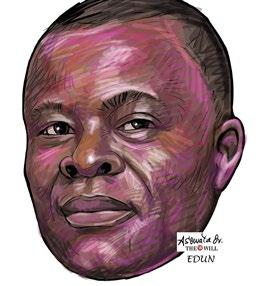

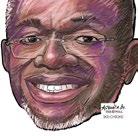


















Nabila Aguele is the Chief Executive, Nigeria at the Malala Fund. Her career began with law, then evolved into governance and policy before eventually leading the Malala Fund in Nigeria. You might wonder what shaped these transitions. According to Aguele, the decisions were rooted in active reflection on where she was, an internal pulse check to determine whether she felt that the work she was doing was helping her develop the skills she needed to have an impact and truly show up in ways that she does. In each moment, she has been able to carry forward all that she has learned—the connections, the skills acquired— and she has been able to apply those skill sets in new ways in each season. For Aguele, there is no typical day at the Mala Fund, and she loves the variety. She thrives on work that is dynamic and multifaceted, and allows her to show up both internally and externally.
There’s much more to Nabila Aguele and the Malala Fund in Nigeria. Scroll to pages 8-10 to read about it.
If you are new to metallics, you should know that they are no longer reserved for parties or red carpets; they’ve found their way into everyday fashion. From subtle accessories to bold statement pieces, metallics can instantly make any outfit look polished and modern. Our fashion pages show you just how to achieve this. Check out pages 4 and 5 for this.
Luxury silk is featured on page 12 this week, and it discusses ageing as a woman. From the sudden weight gain, especially in the middle section, to strange itches, this one is for the ladies. I urge you to read it; you’ll probably be able to relate to most of it.
Until next week, enjoy your read.







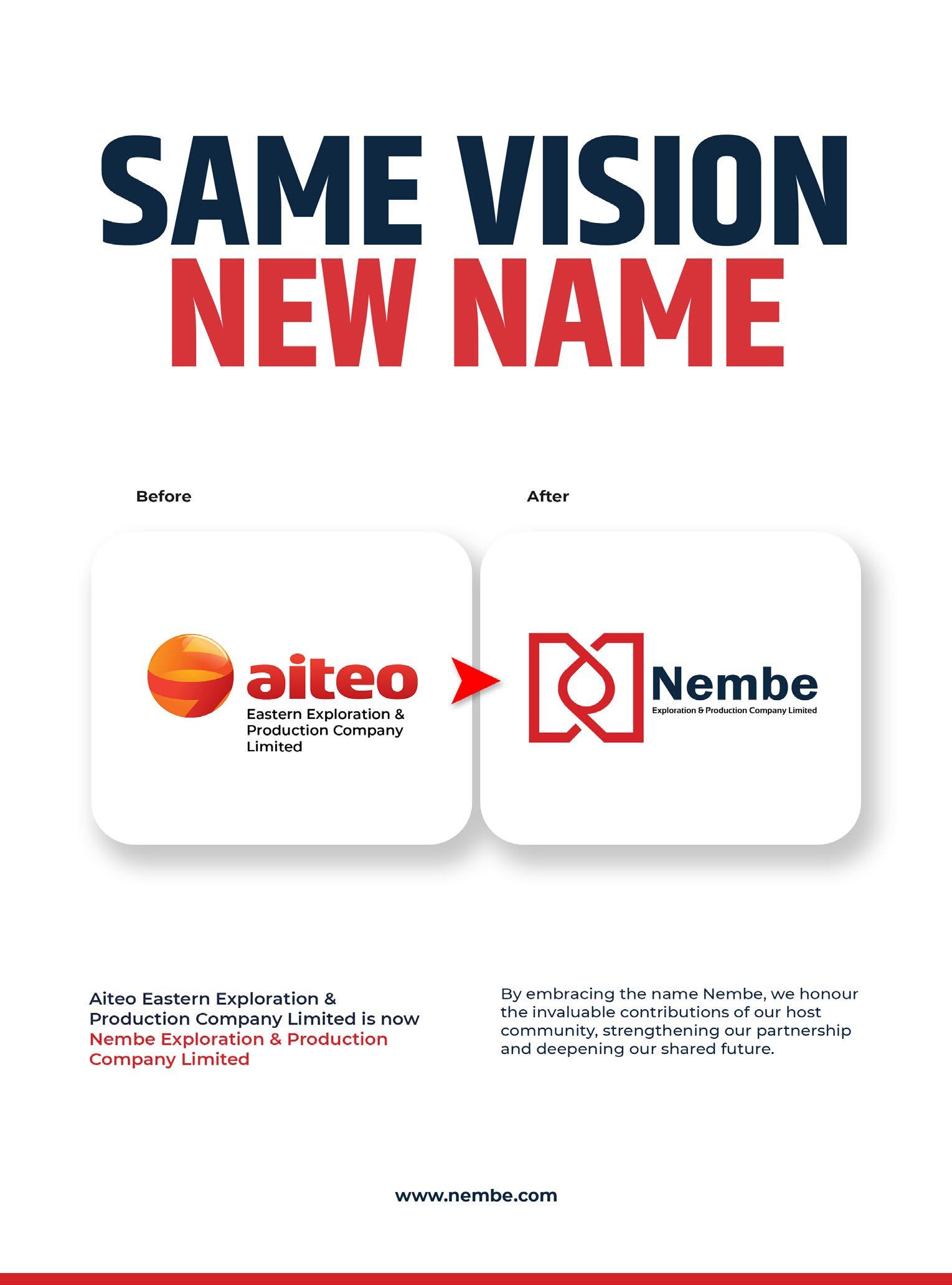


SUNDAY, SEPTEMBER 07, 2025
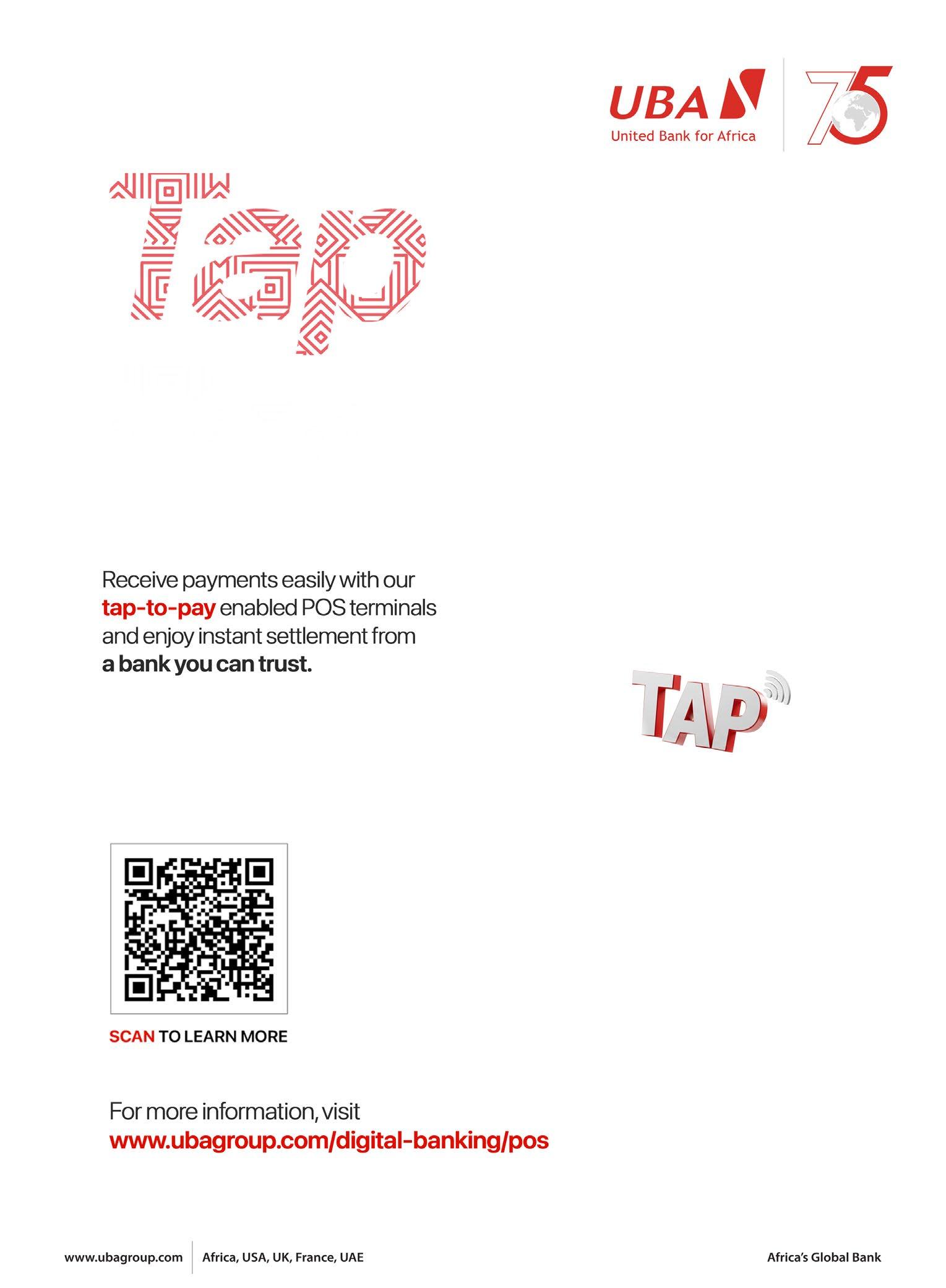


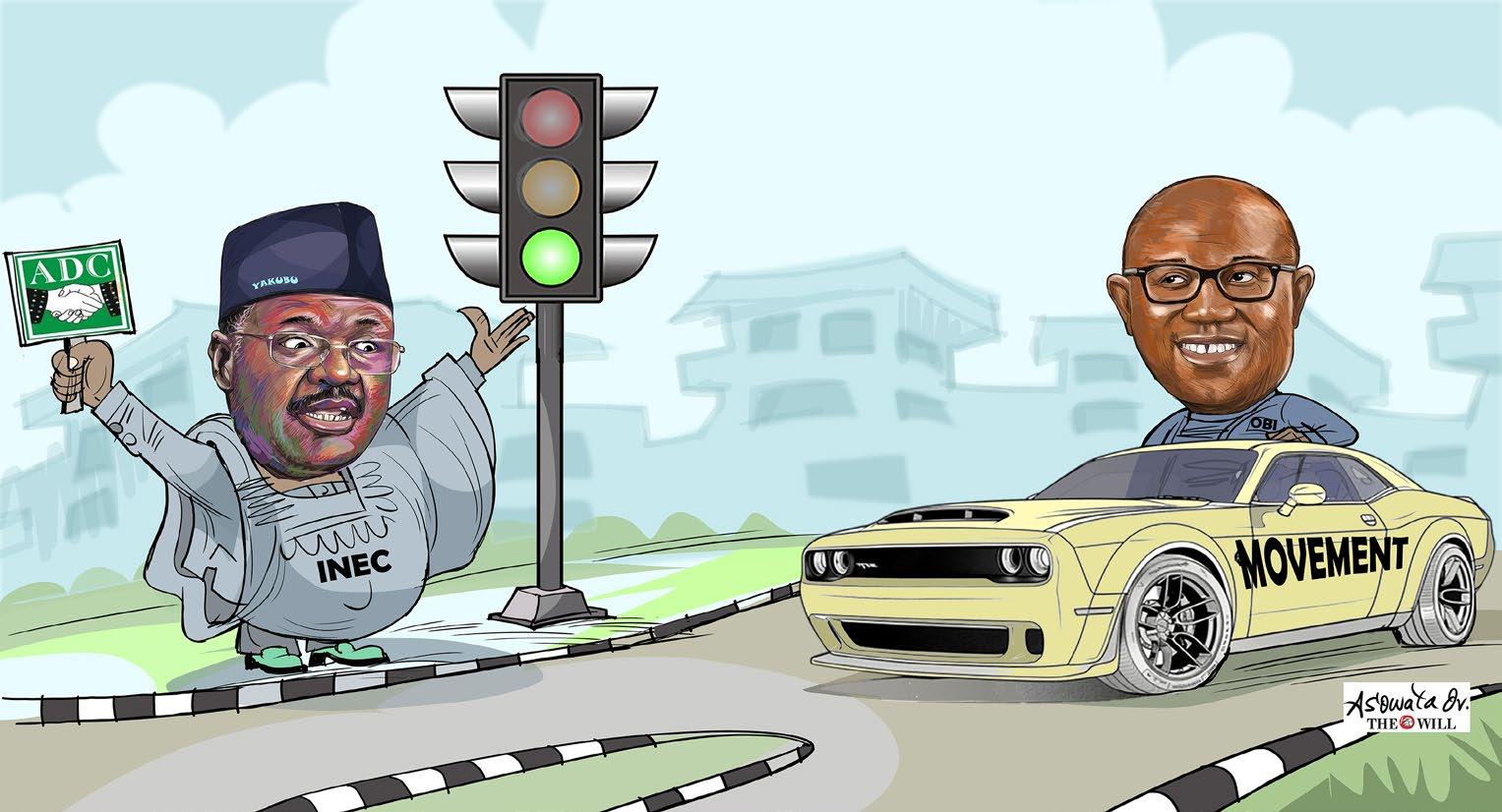
BY AMOS ESELE
The uncertainty surrounding the leadership of the coalition backed opposition African Democratic Congress, ADC, could fade away soon as the Independent National Electoral Commission (INEC) opens talks with the Senator David Mark-led Interim National Working Committee, NWC, of the party, THEWILL can report.
Credible INEC sources told THEWILL in confidence that as part of INEC Chairman, Prof. Mahmood Yakubu’s commitment to respect the supremacy of political parties in the conduct of their internal affairs, he met with some members of the ADC's Interim NWC and informed them that administrative errors had led to the impression that the Commission was acting unfavorably towards the party.
THEWILL sighted four letters dated July 29, 2025 and addressed to Prof Yakubu. They were all signed by Nwosu and Abdullahi. They contained information on the 62 new national officers of the ADC as ratified by the outgoing exco; the submission of names of the new principal officers of the party for upload in the website of the Commission; the submission of the specimen signature of new principal officers of the party and the report of the 99th National Executive Committee meeting of the party held on the same date (July 29).
The new ADC ExCo was officially unveiled on July 29, 2025. Expectedly, the new exco ought to begin communication with the electoral umpire, THEWILL gathered. “This is what is being sorted out,” a senior ADC official told THEWILL on the condition of anonymity.
Reacting, the Chief Press Secretary to INEC Chairman, Rotimi Oyekanmi, said the ball was in ADC’s court.
The errors were said to have arisen because the erstwhile Executive Committee of the ADC led by Ralph Nwosu, who had stepped down for the new ExCo led by Senator David Mark, were the ones still communicating with INEC (Nwosu as Chairman and Sa’id Baba Abdullahi as Secretary) with little input from the new executives. This procedural error is now being resolved according to both INEC and ADC sources.
In a short statement to THEWILL, he said, “The Commission does not have any position. Once ADC complies with the existing rules, the Commission will recognise the new Exco.”
Given this new development, THEWILL






Some leaders of the Obidient Movement and LP who hold no positions so as to avoid being accused of inter-party activity are pushing the move to defect. One of the prominent faces behind this move is the party’s governorship candidate in the 2023 governorship poll in Lagos State, Gbadebo Rhodes Vivour. He is said to be coordinating the plan in Lagos. Other leaders are also making similar moves in various states.
Obi had earlier issued a statement before the August 16, 2025 by-election across 12 states, saying that those who have elections to contest could do so on the platform of Labour Party, while those willing to move to the ADC could freely do so. This directive appears to be what is driving the new push for defection to the ADC.
Already, a coalition of the Obidient Movement and LP in Alimosho Local Government Area of Lagos State, comprising three other development areas, had chosen Saturday, September 6, 2025 for a public announcement of their defection to ADC. Rhodes Vivour was expected as Chief host of the event. As at press time, the planning committee had complained of police harassment. They got to the planned venue of the event on Friday and found a sentry there.
They claimed they had formally written to the Area Commander of the Police to notify the office of the planned gathering, but were surprised to see policemen restricting access to the venue. In a video sent to this newspaper by the organisers, Rhodes Vivour is captured promising to lead a delegation to the Commissioner of Police to resolve the matter, saying, “It is their democratic right to gather and associate and nobody is going to deny them that right.”
At the formal declaration of Rhodes-Vivour, his supporters and some members of the Obidient Movement into ADC on Saturday, thugs suspected to have been mobilised by security operatives stormed the second venue secured for the event, Church Gospel Mission prayer ground in Alimosho and dispersed Rhodes-Vivour’s supporters, leaving many injured during the attack. The thugs broke down the doors and windows of the church and prevented the injured from coming out. Later, the Police arrived and cordoned off the area, preventing people from leaving until Rhodes Vivour prevailed on them to allow everyone leave the venue. One of the OM leaders at the event confided in THE WILL that they were undeterred
and would go ahead to hold a strategic meeting and " finish what we have started.'"
Sources in the Obidient Movement told THEWILL that their early defection from the LP into the ADC would enable them build a formidable structure that Obi could ride on to successfully challenge for the party’s presidential ticket.

“From our assessment, PDP members currently dominate in the ADC. We have to make some adjustments by holding official positions in readiness for its presidential primaries. That is why we have to move into the party before it holds its convention,” a leader of the Obidient Movement told THEWILL
Will the Senator Nenadi Usman-led LP move into the ADC if Obi becomes the presidential candidate of the ADC?
Special Media Adviser to Senator Usman, Ken Asogwa told THEWILL that the LP stands by its May 2025 declaration that Obi is free to join the coalition, even as he remains a card- carrying member of the party. He argued that the party has no plan to dissolve into the ADC. He accused the Abure-led faction of peddling the story of defection as a way to smear the Nenadi Usman led party.
“There is no fact in that story. The Nenadi Usman-led party was the only Labour Party in Nigeria. When Obi opened discussion with the coalition, we said on May 26, 2025 that his participation received our blessing. Obi himself stated that he was in the coalition for the 2027 General Election. He is still a member of the Labour Party. But the party is not going to dissolve into the coalition. In fact, we have rolled out the plan to conduct ward and state congresses beginning next month,” Asogwa said.
When asked if Obi decides to remain in ADC, would the LP’s blessing translate into support for him, Asogwa drew blank.
“ I have stated before and that statement still stands that Obi is a member of the LP and at the same time, he maintains a partnership with the ADC for the 2027 general election. Things will become clearer at the end of November
THEWILL reports that the INEC had declared the Abure-led faction illegal during the August 16, 2025, by-election. In its response to a lawsuit filed by Abure, its exclusion from participating in the August 16 LGA polls, INEC had insisted that the tenure of the National Executive Committee (NEC) led by Abure had expired, adding that by a recent judgment of the Supreme Court, there is presently a vacuum in the leadership of the LP.
Prior to the conduct of the August 16, 2025 by-election, INEC had argued that the March 27, 2024, convention held at Nnewi in Anambra State, where Abure claimed that he and other members of his National Executive Committee were reelected, was conducted "in contravention of the Constitution of the Federal Republic, 1999 (as amended), the Electoral Act, 2022, Regulations and Guidelines for Political Parties 2022 issued by the Commission and the plaintiff’s Constitution 2019.”
INEC told the Federal High Court that based on the Supreme Court’s verdict, the plaintiff could not "convene valid primaries to field candidates for the upcoming 2025 by-elections into the various constituencies scheduled to hold on 16/08/2025 under the leadership of Julius Abure who is no longer the National Chairman of the plaintiff as held by Supreme Court.”
It added, “As at the time the date of the by-election was given, the Court of Appeal judgment by which Julius Abure was recognised as the National Chairman of the party was set aside by the Supreme Court”.
On his part, the National Coordinator of the ‘Obidient Movement,’ Tanko Yinusa responded to the question by saying that the Obidient Movement goes anywhere Obi goes, "without question or doubt."
According to him, it is only natural that the OM should follow Obi wherever he goes because he is the leader of the OM.
“I have stated before, and that statement still stands, that Obi is a member of the LP and at the same time, he maintains a partnership with the ADC for the 2027 general election. Things will become clearer at the end of November. Again, Obi is the leader of the ‘Obidient Movement.’ Wherever he goes, we will go with him because the Movement is the structure we have for him.” Yinusa said. Yinusa, who recently stated that the OM is waxing strong in about 23 states across the country, maintains that the Movement is the “structure we are putting behind Obi,” he told THEWILL.

R-L: Executive Director, Maritime Labour and Cabotage Services, Nigerian Maritime Administration and Safety Agency, NIMASA, Jibril Abba; Flag Officer Commanding (FOC), Western Naval Command, Rear Admiral M.G. Oamen; Director General, NIMASA, Dr Dayo Mobereola; Executive Director Operations, NIMASA, Engr. Fatai Adeyemi and Command Operations Officer, Western Naval Command, Commodore A. Mohammed during a courtesy visit by the FOC to the NIMASA headquarters in Lagos.
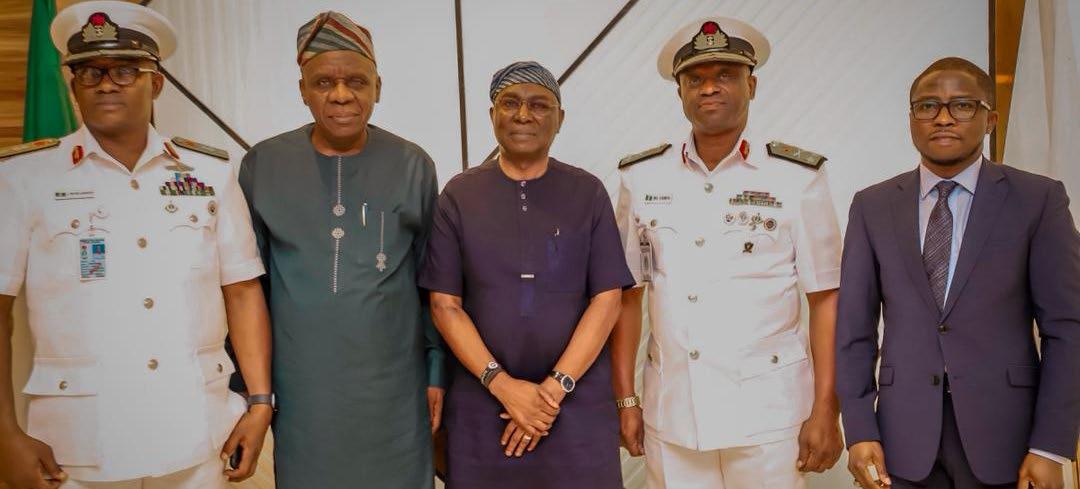
Fuel scarcity looms in Nigeria as the Nigeria Union of Petroleum and Natural Gas Workers, NUPENG, prepares to embark on a strike nationwide from Monday, September 8, 2025, in protest against what it described as anti-union labour practices by Dangote Refinery in deploying newly imported Compressed Natural Gas, CNG, to distribute fuel across the country.
The union’s National President, Prince Williams Akporeha, and General Secretary, Afolabi Olawale, said the Refinery’s plan failed to accommodate the interest of petrol tanker drivers in the union, thereby rendering them redundant.
According to the NUPENG leaders, the wider implications of Dangote Refinery’s deployment of 10,000 imported trucks for nationwide distribution of petroleum and diesel products initially appeared to be a welcome investment in the downstream sector, but it has raised questions among stakeholders, including the National Association of Road Transport Owners, NARTO, about its wider implications.
existing trade unions.
According to NUPENG, the recruitment of drivers for the trucks began on August 29, 2025 and the applicants were reportedly required to sign undertakings not to join existing unions in the oil and gas industry. The union described this as contrary to established labour rights.
“The recruitment being carried out on the condition of not joining existing unions is a matter of serious concern to us. This requirement does not align with Nigeria’s Constitution, labour legislation or international conventions on freedom of association.”
NUPENG cited Section 40 of the Nigerian Constitution, which guarantees the right to freedom of association, as well as Section 9(6) of the Labour Act, which prohibits penalising workers for joining or not joining unions.
and unconstitutional.”
NUPENG called on the Nigerian Midstream and Downstream Petroleum Regulatory Authority (NMDPRA) to exercise its statutory powers under Section 32 of the Petroleum Industry Act (PIA) to promote competition and prevent restrictive practices in the petroleum sector.
They said the strike would go on as planned because despite repeated efforts to engage both government agencies and the companies involved, no satisfactory resolution had been reached.
“Having exhausted all available avenues of dialogue, we are left with no option but to embark on a nationwide industrial action beginning from Monday, September 8, 2025,” the union declared.

To resolve the feared implication, Akporeha and Olawale said NUPENG and NARTO requested a meeting with the Chairman of Dangote Group, Aliko Dangote, which was held on June 23, 2025, with Alhaji Sayyu Dantata representing him. At that meeting, the union stated that it was informed that the trucks would be operated under a new arrangement that excluded
It further referenced Nigeria’s ratification of the International Labour Organisation (ILO) Convention No. 87 on the freedom of association, stressing that the convention is binding and enforceable under Section 254C(2) of the Constitution.
“As General Secretary of NUPENG, my duty is to protect the welfare of our members,” Olawale said, adding, “Dangote Refinery’s intention is to throw out workers into unemployment, many of whom had been doing that work for over 40 years. This is unjust, unfair

NUPENG assured the public that the strike was not intended to create hardship but to safeguard workers’ rights and ensure a fair and competitive downstream petroleum industry. They appealed to Nigerians for understanding and called on other labour organisations, including the Nigeria Labour Congress (NLC) and Trade Union Congress (TUC), to show solidarity.
They also advised members of the Petrol Tanker Drivers Branch of NUPENG had already been advised to seek alternative employment or skills training if the matter was not resolved.
BY FELIX IFIJEH
Former Vice President Atiku Abubakar, on Friday, stated that the recent attack by political thugs on former Attorney General of the Federation, Abubakar Malami, and the invitation from the Kaduna Police Command to former Kaduna State Governor, Nasir El-Rufai, signalled a troubling trend towards authoritarianism under President Bola Tinubu.
While the former AGF had alleged that political thugs, belonging to the All Progressive Congress (APC), attacked him in Kebbi State on Monday, the Kaduna Police Command had summoned El-Rufai and seven members of the African Democratic Congress (ADC) for questioning over allegations of criminal conspiracy, public incitement, mischief, and inflicting grievous harm. The invitation, contained in a letter dated
September 4, 2025, was signed by Deputy Commissioner of Police (CID), Uzairu Abdullahi. It directed the ADC State Chairman to present El-Rufai and the others before the State Criminal Investigation Department (SCID) on September 8, 2025, in connection with a petition filed by unnamed complainants.
Speaking in a statement on Friday, Atiku said these incidents and the violent disruption of the Katsina Elders Forum meeting on security reforms were not only condemnable but “signify a coordinated and dangerous assault on dissenting voices, civic freedoms, and the very essence of pluralistic democracy.”
Atiku emphasised that “No government that resorts to intimidation and uses security agencies as weapons
against perceived opponents can genuinely uphold democratic principles.
“Without a doubt, Nigeria is dangerously close to slipping into authoritarian rule if these patterns of repression continue unabated. We cannot afford to return to an era marked by fear, silence, and impunity."
While calling on all Nigerians, including Statesmen, to recognise the urgency of the moment, Atiku said. “Defending our democracy cannot be the sole responsibility of the opposition; it is a collective national duty. Power is transient, but history will harshly judge those who wield it against the people instead of in their service. Nigeria belongs to all of us, not just the ruling party or any single individual.”

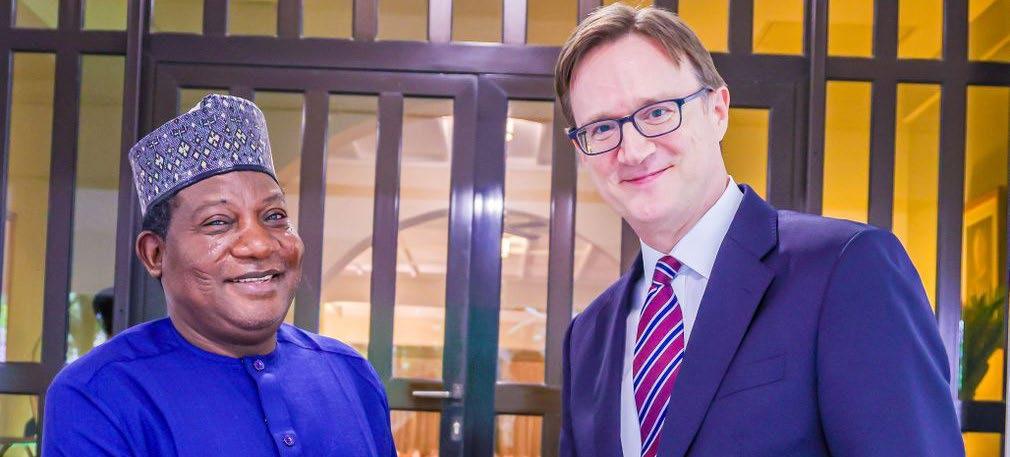
The Executive Chairman of the Economic and Financial Crimes Commission, EFCC, Mr. Ola Olukoyede has observed that as an innovation and transactional technology in the global economy, cryptocurrency requires governing rules to regulate its ecosystem in the country in order to prevent its fraudulent abuse.
He made the observation in Abuja when the Stakeholders in Blockchain Technology Association of Nigeria, SIBAN, led by their president, Obinna Iwuno, paid him a courtesy visit at the Commission’s corporate headquarters.
Speaking through his Chief of Staff, Commander of the EFCC, CE Michael Nzekwe, Olukoyede stated that “Crypto is the new oil. There's so much money in crypto. The ecosystem is something that needs to be properly regulated. If that regulation
is not done, even the genuine actors will run into big problems. The truth is that there's a thin line between the genuine crypto operators and the fraudsters. What has been happening is that even politically-exposed persons are now using it as a means for laundering money and some of the actors in the ecosystem are falling for them. Even some of the ones you say are genuine, launder money. So , it's important that we're having this particular meeting,” he said.
While encouraging players in cryptocurrency and blockchain technology to prioritise enlightenment and training of investors, Olukoyede noted that SIBAN could contribute to the fight against money laundering by being whistleblowers.
Earlier in his remarks, Iwuno noted that the critical place of cryptocurrencies and blockchain technology
in the national economy has motivated SIBAN to draw up a set of regulatory codes.
He called for collaboration with the EFCC, stating that it would enable SIBAN to make meaningful input in the fight against investment fraud and money laundering.
Speaking further, Iwuno stated, “We have the largest population in Africa, we have the largest population of youths. Nigerians are the most active people on this continent, but we also stand at risk that our ecosystem, growing at this fast pace without proper regulations to guide activities on digital assets and blockchain technology, may open up to risks. Risks in the areas of money laundering, terrorism financing, threats to our national security and even proliferation financing. All of these we take into consideration.”
BY ABDULLAHI YUSUF
The newly established Kano State Signage and Advertisement Agency (KASA) says it aims to collect N1.5 billion in revenue in the last four months of 2025. The organisation has also set a five-year revenue generation target.
The Director-General of the Agency, Comrade Kabiru Dakata, disclosed this while fielding questions from newsmen at Minjibir, near Kano, on Thursday.
“The five-year revenue collection target is aimed at collecting N3 billion in 2026, N5 billion in 2027, while in the second term of the government, the agency would collect over N10 billion annually”, Dakata said. He said the agency, established by the government to regulate outdoor advertisements, would soon
commence operation as all the necessary preparations had been completed. “Even though KASA is a new agency established by Governor Abba Kabir Yusuf to regulate outdoor advertisements, we are going to use both enforcement and revenue collection to achieve our objective.”
He said part of the enforcement was to ensure that the state outdoor advertisement signage posts align and comply with the rules and regulations of the agency.
“On the enforcement aspect, any violation of our guidelines would attract punishment of one month imprisonment, three months community service, or payment of fines ranging from N100,000 to N500,000”, he added.
The director-general stated that the agency is already collaborating with other outdoor advertisement agencies to regulate duplication of their jobs and ensure that they operate within the stipulated laws. He further disclosed that the agency had since commenced registration of business owners who are using signage advertisement posts in the state.
He said the agency is also partnering with the Kano State Urban Planning and Development Authority (KNUPDA) to check indiscriminate pasting of posters and other advertisement signs on public places.
"We would also correct the way and means some advertisement agencies use vulgar language and any materials that offend the religious and cultural sensibilities of the people", Dakata concluded.
BY FELIX IFIJEH
The United Kingdom, on Thursday, reaffirmed its commitment to deepening democracy in Nigeria by promoting good governance, peace and stability, as well as support for electoral reforms.
The British High Commissioner to Nigeria, Richard Montgomery, made the pledge when he met with the Chairman of the Joint National Assembly Committee on
Electoral Matters, Senator Simon Bako Lalong, to discuss ongoing electoral reforms.
A statement signed by Makut Simon Macham, the Special Adviser on Media to Senator Lalong, said the Plateau South senator assured the British High Commissioner that the National Assembly is working closely with stakeholders to amend the electoral act so as to enhance future elections.
While appreciating Montgomery's support in engaging key stakeholders, Lalong assured that the National Assembly will soon conclude the process of electoral reforms.
On his part, Montgomery reaffirmed the UK's commitment to supporting electoral reforms in Nigeria, deepening democracy and promoting good governance, peace and stability.
L-R: Executive Secretary, Nigeria South Africa Chamber of Commerce (NSACC), Iyke Ejimofor; former Director, NSACC, Osayaba Giwa- Osagie; Chairman of the Chamber, Dr Ije Jidenma; Managing Director, Stanbic IBTC Bank;Wole Adeniyi and Vice Chairman, NSACC, Ajibola Olomola, during the visit of NSACC Board to the Stanbic IBTC Bank headquarters in Lagos on September 5, 2025.
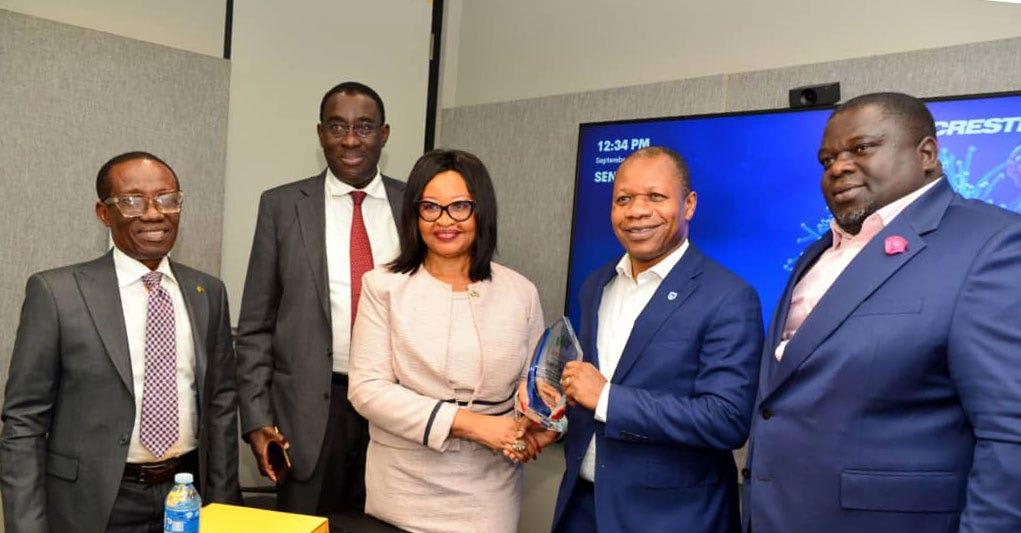
BY FELIX IFIJEH
President Bola Tinubu, on Thursday, reaffirmed commitment to safeguarding the education and future of Nigerian children. The Minister of Education, Tunji Alausa, who disclosed this, said the Federal Government has allocated a total sum of N1,854,277,768 billion to fund the education and rehabilitation of the Chibok schoolgirls abducted by Boko Haram in 2014.
A statement signed by the Director, Press and Public Relations at the Ministry, Boriowo Folasade, stated that the fund, which is part of the Chibok Girls Intervention Programme, will cover tuition, accommodation, vocational training, psychosocial care, and other support services through 2027.
“Under the Renewed Hope Agenda of President Bola Ahmed Tinubu, GCFR, the Federal Government is ensuring that the
rescued 108 girls entrusted to the care of the Federal Ministry of Women Affairs continue to receive comprehensive rehabilitation and academic support”, he said, adding that currently, 68 of the girls remain enrolled at the American University of Nigeria (AUN), Yola, an institution owned by opposition politician and former Vice President, Atiku Abubakar. Despite political criticisms from Atiku, the minister said the Federal government has continued to approve the payment of fees to AUN to ensure that the girls’ education is not disrupted.
“Despite persistent criticisms of this administration by such figures, Mr President has continued to approve the payment of tuition, accommodation and associated fees to AUN to safeguard the education of these young women. This commitment is not only financial, it is moral. It represents
Nigeria’s pledge to turn a dark chapter in our nation’s history into a story of resilience, dignity, and hope. “This also underscores the President’s conviction that the education of Nigerian children is beyond partisan politics.
“While opposition politicians like the former Vice President and others have chosen to exploit national challenges for political gain, President Tinubu has demonstrated true statesmanship by ensuring that Nigerian children, even those studying in institutions owned by his fiercest critics, are not deprived of their education and rehabilitation”, he said.
Alausa urged Nigerians, including opposition leaders, "to join hands in supporting these young women rather than indulging in grandstanding.” He noted that “true leadership is measured by tangible action, not empty criticism.”
The Federal Government has reaffirmed its commitment to expanding access to finance for Micro, Small, and Medium Enterprises (MSMEs), manufacturers, and individuals—sectors regarded as vital engines of economic resilience, industrial growth, and job creation.
Minister of State for Finance, Dr. Doris Uzoka-Anite, gave the assurance in Abuja when she received the Board and Management of the National Credit Guarantee Company Limited (NCGC), led by its Managing Director/Chief Executive Officer, Mr. Bonaventure E. Okhaimo. Commending the Company’s rapid establishment and professional rollout, Dr. Uzoka-Anite said NCGC is a key instrument under President Bola Ahmed Tinubu’s
Renewed Hope Agenda to boost Nigeria’s industrial base and broaden inclusive growth. Director of Information and Public Communication, Muhammed Manga in a statement quoted the Minister to have said, “The success of any institution rests on the calibre of its people. I have full confidence in the leadership and management of NCGC to deliver on this vital mandate,” the Minister stated.
She emphasized that the Ministry of Finance will continue to provide institutional support to ensure NCGC fulfills its role of sharing up to 60% of credit risk with financial institutions, thereby unlocking long-term financing for MSMEs, strengthening manufacturers, and shielding the economy from external shocks. Speaking earlier,
Mr. Okhaimo thanked the Minister for her support and pledged that NCGC would remain focused on catalyzing credit access across Nigeria.
“We are structured to provide assurance to lenders, thereby stimulating credit flow into productive sectors of the economy,” he said. Also speaking, the Permanent Secretary, Mrs. Lydia Shehu Jafiya, praised the progress made in operationalizing NCGC and reaffirmed the Ministry’s readiness to back the institution. “With the right structures and leadership in place, we are confident the Company will play a transformative role in de-risking lending and empowering SMEs and manufacturers,” she said.
BY KAJO MARTINS, MAKURDI
Bayelsa State government and Jampur Group, a Dubai-based company have signed a Memorandum of Understanding (MoU) to set up renewable energy (solar power) and smart metering production plants in the state. The $3m investment would be financed solely by the conglomerate.
Governor Douye Diri expressed delight over the partnership with the company, which he described as a reputable firm with a track record of achievements nationally and internationally.
Senator Diri said the project would serve not only Bayelsa, but also the Niger Delta, Nigeria and even the Gulf of Guinea. He stated that when completed, the factories will make solar panels and smart meters available in the state, and end the frequent trips by Nigerians outside the country in search of these items.
The governor disclosed that Jampur was responsible for the supply and installation of the 60MW gas turbines recently

procured by the state government, stressing that the introduction of smart meters would end frequent clashes between power consumers and suppliers, as those who fail to pay would be automatically disconnected.
He charged the Ministry of Power to ensure that youths of the state were actively involved in the establishment of the factories and given the necessary training to participate actively in the power sector.


L-R: APC Chairman, Bariga LGA, Akin Mejolagbe; Member Representing Somolu Constituency 2 in Lagos State House of Assembly, Samuel Apata and former Chairman of Bariga LGA, Kolade Alabi, during the Lagos State House of Assembly 10th Constituency meeting at Bariga LGA in Lagos on Septeber 4, 2025.

BY KAJO MARTINS, MAKURDI
The Benue State Government has announced a donation of N380 million to the families of security officers who paid the supreme price in the course of duty in Benue State.
Governor Hyacinth Alia, who announced this at the Banquet Hall of Government House, Makurdi, on Saturday, while playing host to Police Officers' Wives Association (POWA), Benue State chapter, explained that the families of each of the 76 police officers that died will receive the sum of N5 million.
The governor said the state government would grant plots of land and scholarship, as well as start-up kits to spouses of the fallen heroes, even if they decide to stay or leave the shores of Benue State.
"No uniformed man in Benue State is our enemy. Police are not bad, soldiers are not bad. If one egg amongst us is bad, let us fish out such an egg", the governor stated.


He said the military, whose primary responsibility is to man our territorial borders, is in some cases deployed to local government
BY FELIX IFIJEH

areas and warned against remarks on the social media platform calling on soldiers to leave parts of Benue State.
The governor stated that the social media platform is a powerful tool that can build but also destroy within minutes, urging people with disagreements to be cautious in offering a positive solution rather than otherwise. He pledged continuous support to POWA to ensure that their children go to school as and when due.
Director-General of Homeland Security, Air Commodore Jacob Gbamwuam (retd) in his welcome remarks, said over 76 officers lost their lives from 2024/2025 in Benue State in the course of duty.
He said it is such a number that prompted Governor Alia to honour them, listing the beneficiaries to include the police, soldiers, Civil Protection Guards, Nigeria Security and Civil Defence Corps, among others.
He commended Governor Hyacinth Alia for caring for the families of the deceased.

In his remarks, the Commissioner of Police, Benue State Police Command, CP Ifeanyi Enemari, who spoke on behalf of other security forces, expressed his appreciation to Governor Alia, saying the gesture will bring succour to the families of affected officers and encourage serving officers.
He praised the governor for the initiative, saying he does not joke with the welfare of security personnel in the state, as seen in the provision of working tools for various forces to tackle criminality. According to CP Enemari, Governor Alia is at the forefront of driving the forces on achieving a crime-free society, promising not to relent so as not to give any room for bandits and other criminals to operate in the state.
On her part, the State Chairperson of Police Officers' Wives Association (POWA), Mrs Ujunwa Enemari, appreciated the support the government of Benue State is giving the security forces and their wives over time.
BY FELIX IFIJEH
By the end of tomorrow, Monday 8, 2025 local contractors, who had laid siege to the Ministry of Finance last Wednesday in protest over nonpayment on N4trn for capital projects executed in 2024, would know whether they were victims of a political tradeoff.
After publicly claiming that the Minister of Finance and Coordinating Minister of the Economy, Wale Edun and the Accountant-General of the Federation, Shamseldeen Ogunjimi were politicising their dilemma, the Deputy Speaker of the House of Representatives, Rt. Hon. Benjamin Kalu had to step in to broker peace.
Speaking during the protest, Secretary of the Association, Babatunde Seun, said the contractors had previously met with the Accountant-General of the Federation, Shamseldeen Ogunjimi, and Minister of Finance and Coordinating Minister of the Economy, Wale Edun, over the delayed payments to no avail. Seun further alleged that the AGF and the Minister had promised payments “within 48 hours” after their previous engagement, stating, however, that only five of its 5,000 members had received payments.
“They have not fulfilled their promises. The government has not fulfilled its promise. They have been paying us piecemeal. Last Wednesday, we had a meeting with the Accountant General of the Federation. And he promised us that all finalised payments will drop into the beneficiaries’ accounts within 48 hours.
“From last Wednesday to today, it’s been about a week. They continue with lies. The Minister of Finance, we have been with him on various occasions. He promised that they would pay the February and March warrants. They released their warrants without cash backing.
“Out of 5,000 people that we are expecting, we only had five people from our platform that received the money. Sir, we believe an elderly man doesn’t lie. But what we can find now is they are deceiving us,” he stated.
The association’s secretary also lamented the suffering of the contractors, noting that some members had run into debts, while others could not pay school fees and provide proper healthcare for their families. He insisted that the contractors would continue to prevent the staff of the ministry of finance from working until their demands were met.
“Until they pay every one of our members, we will not leave the streets. We will continue to stay here. If it takes us till December, we will continue to stay here. They will not work if they continue to keep us this way. We can’t take it anymore.
“We have run out of business. We’ve run out of cash. We’ve run out of everything. School is opening next week. Most of our children are in school. Even in the last term, we couldn’t pay school fees. Is that how we are going to continue? We can’t.
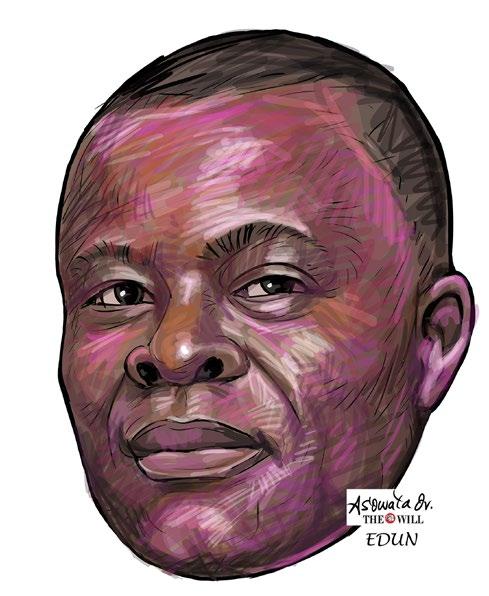
contractors suffer injustice over 2024 Capital projects”. “Pay local Contractors now”.
Kalu on Friday successfully brokered a resolution between Indigenous Contractors of Nigeria and Federal Government over the payment of N4trn debt, bringing an end to the standoff. This came after the contractors staged protests in Abuja.
Following his appointment as Chairman of the House Special Committee on Budget Implementation by the Speaker, Rt. Hon. Abbas Tajudeen, Kalu convened an expanded meeting with the contractors, numbering over 80 across the country, with their leadership for an open dialogue on the issue.
In attendance were also the Minister of Finance, Mr. Wale Edun, the Accountant-General of the Federation, Mr. Shamseldeen Ogunjimi and other top government officials. After a marathon meeting lasting over four hours, Kalu announced that all parties had resolved the issues in the interest of the economy.
Kalu’s intervention was hailed by the parties who said that it averted further disruptions, demonstrating the effectiveness of dialogue in resolving disputes. “To this end, payments to contractors are expected to commence from Monday, next week.
Speaking at the end of the meeting, the Deputy Speaker said that a mutually beneficial agreement was reached, expressing his gratitude to the Speaker of the House and his colleagues for entrusting him with the responsibility. He also announced subsequent meetings later this month to evaluate progress.
Bola Ahmed Tinubu, for appointing these gentlemen to occupy various positions.
The Deputy Speaker described the protesters as having shown humility in service, shown diligence in the way the matter had been handled. The parliamentarians, he added, are happy that all they discussed on Thursday would start implementing on Friday.
“ We had over 4 hours engagement and they left here smiling. We got the strategy in place and we’re going to come back on the 21st of this month to review what we’ve done so far, how we’ve ticked the boxes, what needs to be done and the way forward”, Kalu assured. Also speaking, the Minister of finance, Edun commended the Deputy Speaker for his intervention, assuring that payment will commence next week.
He said, “Under the leadership of the Rt. Hon. Benjamin Kalu, we did hold a marathon meeting where all the issues were discussed and a timeline was put in place and a way forward was mapped out and all parties at the end of it left knowing that contractors would be paid for jobs done and we have an orderly and systematic way of dealing with the backlogs which had been approved overtime.
“Once again, we commend the leadership of the House of Representatives and the contractors for their willingness to sit down and dialogue. The Accountant-General of the Federation made some commitments which helped us to chart the way forward.
“We had a peaceful solution. A timeline was put in place and everyone accepted that there are steps that need to be taken, approvals, finalization and orderly procedure for payments. After Friday’s holiday, the Central Bank will open again on Monday and payments will commence immediately”, he stated. The Accountant-General of the Federation, Ogunjimi corroborated the position of the Minister of Finance.
“This process is ongoing. We’ve been paying contractors and we will continue to pay. From Monday, payments will start dropping”, he noted. Earlier in the meeting, the leadership and membership of the association of indigenous contractors of Nigeria expressed satisfaction with the resolutions reached.
Commending the Deputy Speaker for his intervention, the contractors also pledged to discontinue with the protest and hoped to see action by tomorrow, Monday.
“
Once

“All our jobs have been done, completed. Handed over with a certificate that we have finished the job. The one that they have not finished, don’t pay. The one they have finished, we are here to tell them, please, pay,” Seun added.
Some members carried placards that read “National Assembly is folding their arms watching Nigerian

“We met on Wednesday with Finance Minister, Minister of Budget and Planning, Accountant-General of the Federation, Representatives that cut across all the caucuses of the House, including representation from the House Appropriation Committee and Finance,” Kalu said, adding, “We saw the protest and asked them to come, lets have a conversation. I want to thank President
again, we commend the leadership of the House of Representatives and the contractors for their willingness to sit down and dialogue. The Accountant-General of the Federation made some commitments which helped us to chart the way forward





















Page N600, 000

000
Double Spread Half Page N1, 200, 000
10X6 N700, 000
10X5 N650, 000
10X4 N600, 000
10X3 N500, 000
9X6 N440, 000
9X5 N395, 000
9X4 N335, 000
9X3 N310, 000

8X6 N410, 000

8X5 N380, 000
7X5 N320, 000



7X4 N315, 000

6X5 N280, 000

6X3 N145, 000
6X2 N85, 000
5X2 N70, 000
4X4 N160, 000
4X3 N95, 000
4X2 N65, 000
3X3 N60, 000
3X2 N50, 000
2X2 N30, 000
2X1 N15, 000 1X1 N7, 000
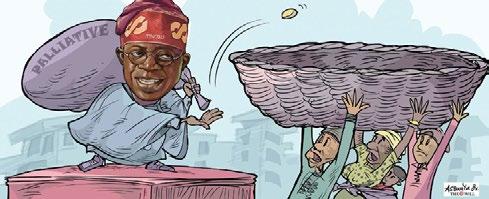









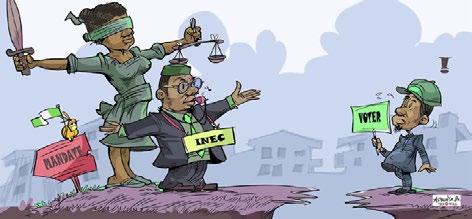













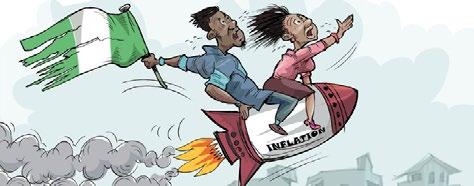
























TThe President, who said he had instructed that he be given daily updates on security operations in Katsina, added that he was reviewing all the aspects of security, saying
“I have to create state
police.
We are looking at that
holistically
“
hat the creation of state police in Nigeria is long overdue can be gleaned from ugly stories about the worsening insecurity in the country, particularly in the North, last week. Two state governors led delegations to the Presidential Villa to beg President Bola Tinubu for more attention on the insecurity in their states. A particular governor claimed he could you end banditry in his state in three weeks if the federal authorities let him and a strong group urged the government to declare a state of emergency on insecurity in Northern Nigeria.
Chairman of the North-East Governors Forum, Babagana Zulum, led a delegation of the six governors in the zone, including Governors Usman Fintiri of Adamawa State, Mai Bala Buni of Yobe State, Agbu Kefas of Taraba and Mohammmed Inuwa Yahaya of Gombe State to the Villa last week and, among other things, they requested increased commitment to the government’s initiative on the training of manpower and provision of technology, with a view to reversing the insecurity facing the North-East.
Addressing the Katsina Governor Raddaled delegation from Katsina State in the same week, President Tinubu hinted at his commitment to the founding of State police, even as he pledged to empower the recently inaugurated National Forest Guards, whose creation received presidential approval on May 15, 2025 but as at press time was still undergoing proper coordination!
The President, who said he had instructed that he be given daily updates on security operations in Katsina, added that he was reviewing all the aspects of security, saying “I have to create state police. We are looking at that holistically,”
The President reminded the delegation that in February 2024, the Federal Government
formed a committee to study the framework for state policing, which has since gained wide support.” So, what is holding the authorities back if the state police have gained wide support?
Under the programme, each state is expected to recruit between 2,000 and 5,000 forest guards depending on its capacity.
1,129 forest reserves along with 8 national parks, 4 wildlife sanctuaries and 29 game reserves are to be covered in this programme.
Already, 11 states have reportedly established some form of forest guards, but they are yet to standardise them to meet national security aims because of the problem of logistics, training and wholesome wage.
How would one explain the spiking in insecurity in Katsina, Kogi, Benue, Borno, Nasarawa, Plateau, Kaduna, Taraba, Niger and Zamfara states, even the FCT, where most of the forests have been providing cover for bandits, kidnappers and other criminals.
Alarmed at the worsening state of insecurity, the Northern Elders Forum last week called on the President to declare a state of emergency in northern Nigeria, because of “the extraordinary scale of the crisis,” according to Prof. Abubakar Jiddere, spokesperson of the Northern Elders Forum. According to him, “the spate of violent attacks, abductions and killings across the region, could endanger Nigeria’s stability and regional peace if urgent action was not taken.
More indicting of the attitude towards eradicating banditry and terrorism in the country was the mocking statement by Governor Dauda Lawal of Zamfara state on

NIGERIA BUREAU: 36AA Remi Fani-Kayode Avenue, GRA, Ikeja. Lagos, Nigeria.
810 345 2286, +234 913 333 3888
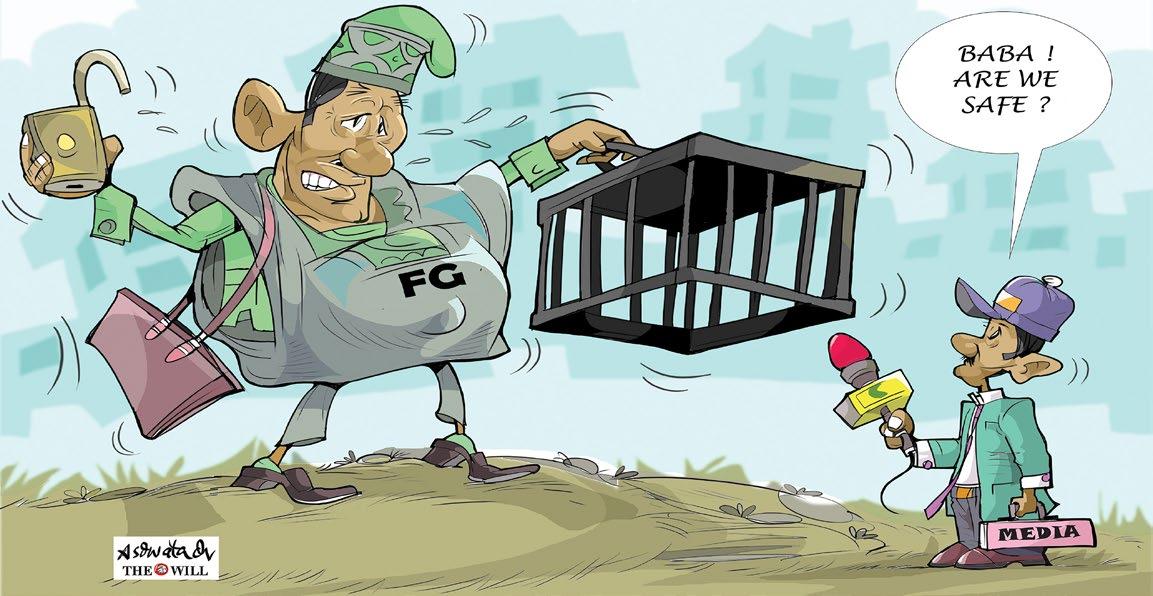
THE TEAM
PUBLISHER/EDITOR-IN-CHIEF –




BY MUHAMMAD MUSA-GOMBE
In a Fourth Republic littered with fallen giants and broken alliances, Bola Ahmed Tinubu stands out, not just for surviving, but for building Nigeria’s most enduring political machine. In recent weeks, I stumbled on a thought-provoking article lamenting the North’s decline, how a region, so rich in people and resources, could still be weighed down by poor leadership and self-sabotage. It struck me that while Arewa endlessly debates its failures, one man from the South-West has, against many odds, built and sustained a formidable political machine for over two decades. That man is Bola Ahmed Tinubu.
Tinubu’s story, as I see it, is not just political history; it is a study in structure, loyalty and resilience. In a Fourth Republic where many political “giants” rose and fell quickly, Tinubu has been the constant, more like the builder, whose network has outlived terms, quarrels and federal pressure. When Nigeria returned to democracy in 1999, Tinubu emerged as one of six state governors elected under the Alliance for Democracy (AD) in the South-West. By 2003, five of his colleagues governors, had lost their states to the PDP tsunami. Only Lagos stood firm. Alone, Tinubu carried the burden of opposition, consolidating his base and re-engineering his political family. That survival instinct became the seed of what is now Nigeria’s most enduring political structure.
Recall his tenure as governor was not without battles. When the Lagos State government created 37 new Local Council Development Areas in 2003, President Obasanjo’s Federal Government retaliated by withholding local government funds for nearly five years. Many expected Lagos to collapse. Instead, Tinubu turned the crisis into reform. He pushed for aggressive tax reforms, professionalised revenue collection and made Lagos less dependent on federal allocations. Salaries were paid, projects continued and the standoff only strengthened his image as a fighter who would not bow.
Unlike many of his colleagues who fell out with their chosen successors, Tinubu cultivated a culture of loyalty and continuity. He invested in young aides and technocrats, lawyers, accountants, engineers, media strategists, many of whom have since become governors, ministers or national leaders. His former Attorney-General, for example, rose to become Vice President; his former Chief of Staff, a two-term governor; others became federal ministers and party leaders. It is this continuity that has kept his political machinery alive when others’ collapsed after leaving office.
Tinubu’s genius was not just in defending Lagos, but in widening his circle. He midwifed the transition of AD into AC, later ACN, and eventually into the All Progressives Congress (APC), which merged in

2013 to challenge the PDP. Two years later, the APC made history by defeating an incumbent president—an achievement unthinkable without the discipline and negotiation Tinubu brought to the table.
The Lagos succession tells its own story. In 2007, Tinubu handed over to Babatunde Fashola, his Chief of Staff, who expanded on his reforms. In 2015 came Akinwunmi Ambode, who after one term was replaced by Babajide Sanwo-Olu, following a push by party elders. The lesson is simple: in Tinubu’s world, loyalty and alignment matter more than sentiment. Candidates are chosen, not just to win elections, but to sustain the structure.
Of course, Tinubu’s style has not escaped criticism. Many Nigerians see his dominance as “godfatherism” that stifles internal democracy. Questions have been raised about revenue transparency in Lagos and the blurred lines between politics and business. During the #EndSARS protests, anger at the system was partly directed at him. Yet, despite the controversies, his political structure has never collapsed. If anything, crises have tested and refined it.
In 2023, Tinubu finally became what he had long prepared for: President of the Federal Republic of Nigeria. The kingmaker became king. But the presidency is a different battlefield, Nigeria is not Lagos. Consensus is harder, legitimacy is contested, and the expectations of 200 million citizens are far weightier than those of one state. Already, tough economic reforms have tested his popularity. The question now is whether the habits of political survival tight structure, loyalty, negotiation can translate into effective national governance.
So why tell this story against the backdrop of northern lamentations? Because there are lessons. Tinubu’s rise was not luck; it was structure, investment in people and the courage to confront adversity. The North, with its vast resources and numbers, cannot continue to excuse failure. Leadership is not about lamentation it is about building, planning, and sustaining. Tinubu built a machine in Lagos that survived federal hostility, opposition landslides and internal betrayals. Arewa, with all its advantages, should reflect: why has it failed to produce such enduring structures?
TINUBU’S RISE WAS NOT LUCK; IT WAS STRUCTURE, INVESTMENT IN PEOPLE AND THE COURAGE TO CONFRONT ADVERSITY
Tinubu is not flawless, and he might not be universally loved. But his political story is a phenomenon worth studying. In a democracy where many fade after one term, he has remained relevant for a quarter of a century. That endurance is no accident. It is proof that leadership, when matched with vision and structure, can outlast storms. Nigeria needs more of that resilience, and the North, if it truly seeks renaissance, must learn the same discipline.
BY ABIODUN KOMOLAFE
The best way to view the Nigerian nation is that it stands at a critical juncture. The central question is how to transform it from its current state into the country it ought to be; one of the world's top 12 economies, with a low poverty rate and a growing, sustainable middle class.
In this context, the actions and decisions of the current Federal Government are particularly significant. The government has made a very good start. While this is a contentious statement, it is the stark and honest reality. Without a painful fiscal rebalancing of the economy, Nigeria would have been a basket case by today, seeking a bailout from the International Monetary Fund (IMF). Therefore, the Bola Tinubu Administration deserves credit for averting what could have been a humiliating disaster and betrayal of the high hopes of independence.
In the span of just a few days, two events have occurred that helped to illuminate Nigeria's current dilemma. The President's state visit to Brazil, for instance, is significant not because it was unusual, but because the destination itself holds a deeper meaning.
Beyond the signing of the Memorandum of Understanding, Brazil's experience should serve as a roadmap for the present government. During his first term in office, President Luiz Inácio Lula da Silva presided over a period where, according to figures from international organisations like the World Bank, approximately 40 million Brazilians were lifted out of poverty. This is an amazing feat for any democracy!
During his eight-year tenure, Lula da Silva never controlled the National Assembly and was consistently forced to negotiate legislation clause by clause. In spite of this, he pulled millions out of poverty, expanded the middle class and unleashed Brazil's hidden potential. This is a feat the Nigerian government should examine closely.
There is a lot to learn from Brazil. For example, the country used its homegrown school feeding programme, not only to benefit schoolchildren, but also to transform itself into a major agricultural powerhouse that exports semi- and fully-processed goods. This success was so significant that one of the articles of impeachment against Dilma Rousseff, Lula da Silva's successor, was that Brazil had failed to meet its soybean export target to China.
In revamping its homegrown school feeding programme, Nigeria should have paid special attention to the similar programme engineered by Lula da Silva. The laudable recapitalisation of the Bank of Agriculture (BOA) should provide a launching pad for revitalising this programme and modernising Nigeria's entire agricultural value chain. This would lay the necessary foundation for the agro-allied sector to contribute at least 60 percent of Nigeria's foreign exchange earnings by 2032.
Another key lesson from Brazil is the success of its respected development bank, Banco Nacional de DesenvolvimentoEconômico e Social (BNDES). As The Economist once highlighted, it's the world's largest development bank, providing loans for major infrastructure projects with terms of up to 34 years. To learn from its success, a team from BOA should have been part of the delegation to build long-term relationships and hold detailed discussions with BNDES management.
Brazil and Nigeria, both developing nations, show divergent paths. Brazil's diversified economy and stronger social systems have resulted in a GDP five times Nigeria's and a much higher life expectancy. Nigeria's economy, however, is crippled by its heavy dependence on oil, creating a “rentierstate” where political elites control wealth instead of fostering a productive, broad-based economy. This has led to a profound disconnect between the nation's immense resources and its citizens welfare.
The story of Nigeria and Brazil is an age-old joke that often makes its rounds. As the tale goes, Nigeria and Brazil arrived at the gates of heaven at the same time. Brazil's representative began to complain to Saint Peter: “Why did you bless Nigeria with such an abundance of mineral resources, a fertile land, and beautiful landscapes, yet we were given so little?” Saint Peter smiled and simply asked Brazil to look at the kind of leaders Nigeria had. This joke speaks to a powerful truth: a nation may be blessed with all the good things in life, but without capable and visionary leadership to show the way, all those blessings can amount to nothing. When you look at Nigeria's case, had it been led by true statesmen like Obafemi Awolowo, Ahmadu Bello and Michael Okpara, our story might have been entirely different. Nigeria's primary challenge is economic. Until the root causes of poverty are addressed, the myriad of political and security issues cannot be vanquished. This is the critical task facing the Tinubu administration. It must demonstrate the leadership and skills required to propel the nation forward, while citizens must cultivate the civic virtue to demand no less. Drawing from Brazil's experience offers valuable lessons, and it is hoped these were thoroughly absorbed.
NIGERIA'S PRIMARY CHALLENGE IS ECONOMIC. UNTIL THE ROOT CAUSES OF POVERTY ARE ADDRESSED, THE MYRIAD OF POLITICAL AND SECURITY ISSUES CANNOT BE VANQUISHED
A second issue is the powerful speech given by Julius Sello Malema of the South Africa’s Economic Freedom Fighters (EFF). The Nigerian Bar Association (NBA) showed great foresight and guts by inviting the firebrand to speak.
Malema was absolutely correct: the future of sub-Saharan Africa should be built upon a working partnership between post-apartheid South Africa and a resurgent Nigeria. This offers a clear, visible way out of the African dilemma, with the two forces working in tandem to realise the laudable objectives of the African Continental Free Trade Area.



Continues from page 34
The statistical firm further noted that the success of the petrochemical facility is expected to draw in investors into the oil and gas industry, improving the country’s scanty foreign direct investment. This improved investments in the upstream, midstream and downstream sub-sectors will facilitate growth and ensure

While the refinery is dubbed to ensure effective subsidy management, money used for subsidies can therefore increase spending for public investment in terms of infrastructure.
Continues from page 34
decrease in the number of deals (down by 14,418 transactions).
In the extensive report, ADSR said “Nigeria, for the past 28 years, has solely relied on imported refined petroleum to meet its domestic needs despite being Africa’s biggest oil producer.
“But with the Dangote Refinery producing PMS locally, the need for importation decreases and potentially meet the needs of other countries in
“This reduces the demand for foreign currency used to pay for imports, potentially easing pressure on Nigeria’s foreign exchange
The advisory and research firm noted that the reduced need for foreign currency to import refined products could lead to a strengthening of the Naira, as fewer dollars will be required for
“This, in turn, could improve the overall balance
The ADSR also stated that Dangote refinery’s tax payment will increase Nigerian government revenues that are falling, thereby enhancing the
According to the report, the operation of the facility “may push the government to start working on its own refineries”, leading to competition and stimulating economic growth.
“Savings from fuel subsidies can be reallocated to other sectors (e.g., health, education, infrastructure) as expenditure.
“Improved revenue is expected to generally lead to less borrowing and improved fiscal sustainability,” the report stated.
Nigeria recorded a balance of payment (BOP) surplus of $6.83 billion in 2024, marking a sharp reversal from consecutive deficits posted in the prior two years.
The latest figures, released by the Central Bank of Nigeria (CBN), signal a broad-based resurgence in the country’s external finances, aided by wide-ranging macroeconomic reforms, stronger trade flows, and a renewed sense of investor confidence.
The BOP, which measures the country’s financial transactions with the rest of the world, swung from a deficit of $1.21 billion in 2023 to a $6.83 billion surplus in 2024, underpinned by a sharp improvement in the current and capital account positions.
Nigeria's foreign exchange reserves surged to $41.00 billion as of August 19, 2025, the highest in 44 months largely aided by the relief that domestic production of petrol at the Dangote Petroleum Refinery provided. With the removal of the corrosive fuel subsidy linked to massive importation of petroleum products, Nigeria is poised to claim prosperity as a birthright with the relief Dangote Petrol provides.
This increase in volume alongside decline in value suggests that investors are focusing more on cheaper financial stocks instead of high-priced stocks like the banking – a reflection of the cautious optimism that defines the fortune hunters’ behaviour in the present economic circumstance.
Bond Market Performance
Just as the equity market ended on a bearish note, so did the Bond marketrecording a total of 17,617 units valued at N18.000 million traded in 23 deals during the week. This indicates a clear drop in comparison to the previous week's performance which recorded a total of 80,523 units valued at N74.045 million transacted in 32 deals.
Industry analysts posit that the current bond market performance also reflects investors’ behaviour under the cautious optimism sentiments in the capital market as dictated by the ‘stable’ interest rate and foreign exchange market.
Sector Indices, Market makers
A closer look at the report
showed that all sectors finished the week lower, with the exception of the NGX Commodity Index and NGX Growth Index which gained 0.04% and 0.15% respectively. The NGX AseM index closed flat yet again.
Nineteen equities appreciated in price during the course of this week, a drop from the thirty-two equities recorded in the previous week. Sixty-four equities recorded a decline in price, higher than fifty-seven equities in the previous week.
The insurance sector topped the activity chart for price gainers. This superior performance could be attributed to the recently enacted Nigerian Insurance Industry Reform Act 2025 (NIIRA) widely applauded for its improved, modern legal framework, increased capital requirements, and a push for digitalisation and transparency.
A specific example is the profit and dividend drought Guinea Insurance Plc has gained investors' attention following shareholder approval for capital raising to meet regulatory benchmarks and enhance its capital base.
unyielding commitment to building a more inclusive and prosperous Nigerian economy.
“As we reflect on the past, we also look ahead with a challenge to stakeholders: act boldly, think differently and work collaboratively to unlock Nigeria’s true potential in line with the government’s $1tn economy goal.”
Founded in 1995, Afrinvest has evolved into a trusted voice in Nigeria’s financial providing innovative asset management. Over the past 30 years, the firm has built
The Deputy GMD, Afrinvest, Victor Ndukauba, stated, “This milestone gives us a moment to take stock of our journey, from one of the earliest Nigerian stock brokerage firms to the present, where we proudly stand as an advisory partner of choice for investment banking, asset management, securities trading, trust services, consultancy & research, and FinTech. Afrinvest has consistently demonstrated that with the right vision, integrity and innovation, Nigerian financial institutions can compete globally.”
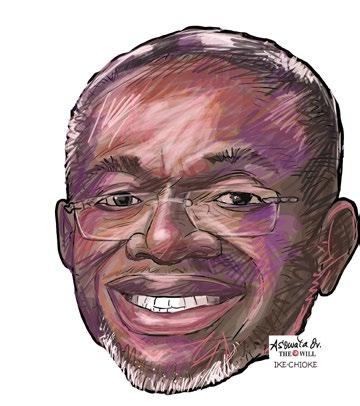
Oil & Gas, Logistics, and Domestic Manufacturing.”
The 2025 BSR arrives at a time of significant global uncertainty. According to the International Monetary Fund’s latest World Economic Outlook, global growth is projected at 3.0 per cent in 2025, up from the 2.8 per cent forecast earlier in the year, but still fragile due to lingering tariff shocks, FX volatility and distorted financial conditions. SubSaharan Africa, however, is expected to grow by 4.0 per cent, supported by commodities and strong export demand.
not just a celebration of longevity; it is a

The 2025 edition of the BSR marks two decades of thought leadership, transparency and reform advocacy. Since its inception, the BSR has provided critical analysis that shaped discourse and policy in Nigeria’s financial services industry.
Emphasising the importance of the report, the Managing Director, Afrinvest Consulting Limited, Abiodun Keripe, said, “The BSR has become a trusted resource for regulators, investors and development partners. This year’s theme, ‘ACT-BOLD: Turbocharging Nigeria to A New Growth Frontier’, speaks directly to the urgency to diversify the economy and harness the power of seven high-impact sectors: Agriculture, Creatives, Tourism & Hospitality, Banking & Finance,
This macro environment points to the need for extraordinary reforms and strategic investments to position Nigeria as a competitive player in the global economy.
The celebration will feature keynote speeches, thought leadership sessions and networking opportunities designed to inspire actionable solutions for the next phase of Nigeria’s growth.
Beyond the celebrations, the event is a call to action; to turbocharge Nigeria’s economy, unlock opportunities across key sectors, and chart a bold path for the next generation.

Picture this: You are sitting across from potential investors in a Lagos co-working space or perhaps on a video call with a venture capital firm in Cape Town. The familiar phrase echoes in the room: investor confidence. It rolls off tongues in boardrooms, flows through fintech discussions and shapes economic conversations from Cairo to Nairobi. But what does it truly mean for African entrepreneurs?
Something we’ve come to discover is that investor confidence in Africa is fundamentally about storytelling and soul. Not just the reports, the market penetration forecasts, or the ambitious growth projections but the heartbeat of your mission: the founder's journey and team's resilience. The story that connects your solution to the continent's unique challenges and boundless opportunities.
Somewhere between showcasing user acquisition metrics and demonstrating product-market fit, we sometimes forget that investors, whether they are based in London, New York, or right here in Africa are human beings making deeply personal decisions. They are not just analysing your burn rate; but studying your character. They are also assessing your understanding of African consumers, regulatory environments, and cultural nuances.

When an investor in Kigali or a fund manager in Dubai says we're not confident in this round, what they often mean is: We're not certain this team truly understands the African market they're trying to serve.
This is where African founders have a real edge. Confidence here isn’t about a perfect pitch deck. It’s about authentic connection. It’s knowing that when you’re building a fintech product, you understand financial inclusion across East and West Africa. Or that your agritech solution reflects the lived struggles of smallholder farmers from the Sub-Saharan to the Horn.
True confidence shows up in how you explain your “why.” Can you connect mobile money adoption in East Africa to your payments platform? Can you show how knowledge of the informal economy shapes your business model? That depth of insight, rooted in lived experience, separates truly African ventures from copy-paste global plays.
Logistics in Ghana
Take Ama Agyeman, a Ghanaian founder building a logistics platform to help small businesses in
Accra move goods more efficiently. On paper, her early numbers looked shaky. Delivery times were inconsistent, margins were thin, and customer churn raised eyebrows. An investor looking only at her financials might have walked away.
But when Ama pitched, she didn’t just talk numbers. She shared how her aunt, a market woman, lost half her produce every week due to unreliable transport. She described shadowing informal couriers, mapping the backroads of Accra, and learning why GPS data alone didn’t solve last-mile delivery. She explained how she built trust with drivers by letting them settle balances weekly instead of daily.
Investors leaned in. They saw a founder who understood the real problem, lived the pain point, and was building for her market. One admitted later that while her metrics raised doubts, her cultural insight and resilience sealed the deal.
Now consider Deji Kolawole, a Nigerian fintech founder. His app aimed to help young people save in small, daily amounts. Early traction was modest, and his slide on ‘projected revenue’ looked thin, compared to global fintech benchmarks. But Deji framed the story differently.
He explained how he’d grown up watching friends struggle to save because traditional banks demanded account minimums and endless paperwork. He shared voice notes from users who said his app helped them save for school fees and medical bills for the first time. He pointed out that in Nigeria, trust was the real currency, so his team partnered with community associations and churches to onboard users.
The investors weren’t just hearing about an app. They were hearing about a movement grounded in cultural reality. Numbers mattered, but Deji’s deep understanding of how Nigerians actually save turned a risky bet into a compelling one.
Whether you’re pitching to local angels, international funds, or development finance institutions, remember this: investors want to believe. They’re looking for signals that go beyond metrics.
• Resilience over perfection. Can you navigate shifting regulations across multiple markets? Do you adapt when faced with power outages in Nigeria or weak connectivity in rural Kenya? The ability to thrive despite systemic challenges is more valuable than a flawless plan.
• Cultural intelligence over assumptions. Do you see Africa as diverse markets, not a single block? Can you explain why a strategy works differently in Francophone West Africa than
Many investors backing African ventures already feel connected to the continent, through heritage, experience, or long-term engagement. They want to support founders who can show not just what they’re building but why it matters here
Anglophone East Africa? Nuance matters.
• Local relevance with global ambition. Are you solving uniquely African problems while building something that could expand to other emerging markets? That balance resonates deeply.

Many investors backing African ventures already feel connected to the continent, through heritage, experience, or long-term engagement. They want to support founders who can show not just what they’re building but why it matters here.
Confidence is revealed in tough moments. When asked about regulation, can you show awareness of policy shifts across your markets? When challenged on your competitor landscape, do you highlight advantages born from real local understanding? Do you appreciate both opportunities and constraints, without ignoring either?
Winning investor confidence in Africa requires balance. Yes, you need financial discipline and polished presentations. But you also need cultural intelligence and market intimacy.
Confidence isn’t about having every answer. It’s about showing you’re asking the right questions, and that you understand the realities of building in African markets. It’s proving your solution is not just viable, but necessary.
At the end of the day, confidence in Africa isn’t rooted in perfect unit economics or flashy growth rates. It’s about how deeply you understand your market, how authentically you engage with local needs, and how committed you are to creating solutions that work.
The investors who matter aren’t just betting on your business model. They’re betting on your ability to navigate complexity, deliver impact, and build something meaningful for millions across the continent.
That’s a bet worth taking.
Aramide Abe is a networking expert and a professional in international development. She is the convener of an African business leader network - Naija Startups. Follow arams on Twitter, Website - www.aramide.ng




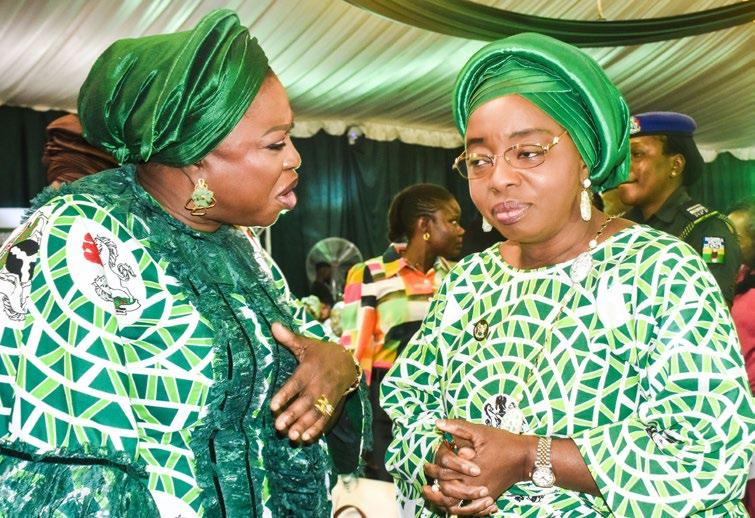
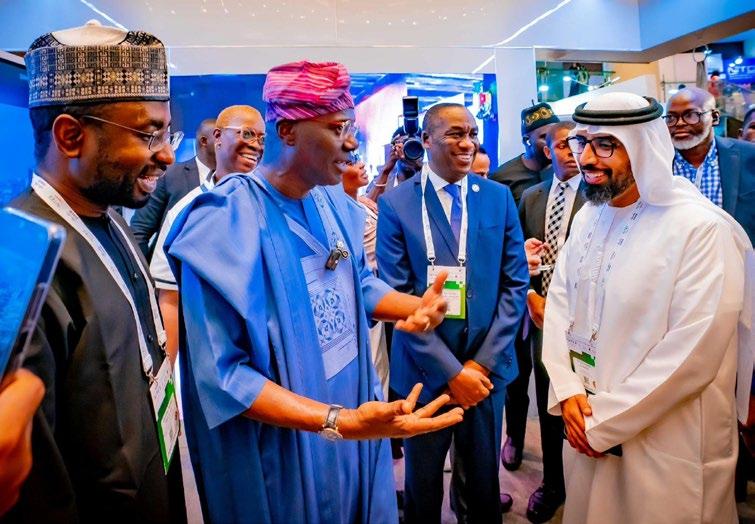
Director-General/CEO, National Information Technology Development Agency (NITDA), Dr. Kashifu Inuwa Abdullahi; Governor of Lagos State, Mr. Babajide Sanwo-Olu; his Deputy, Dr. Obafemi Hamzat and the UAE Consul General in Lagos, Mr. Salem Al Jaberi during the GITEX exhibition walkthrough and welcome address event, at the Eko Hotels and Suites, Victoria Island in Lagos on September 3, 2025.
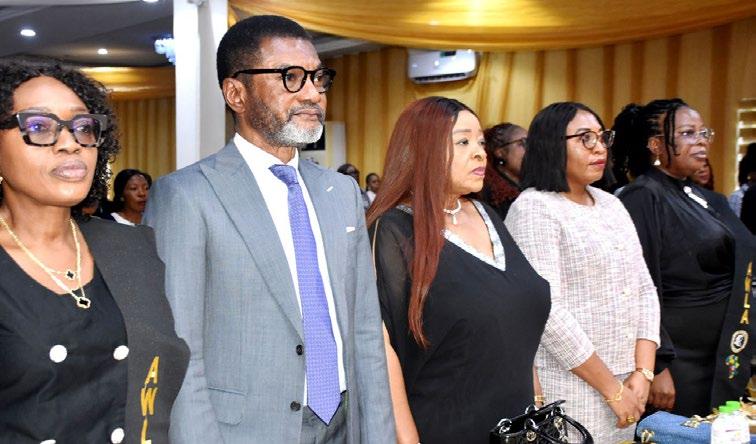

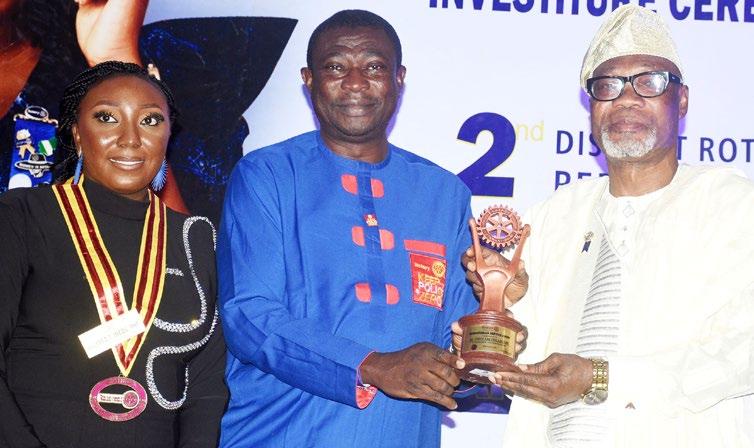
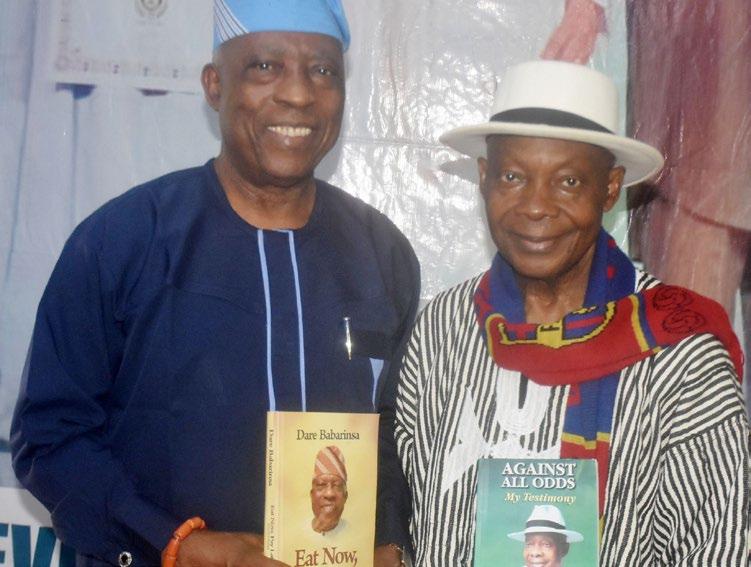

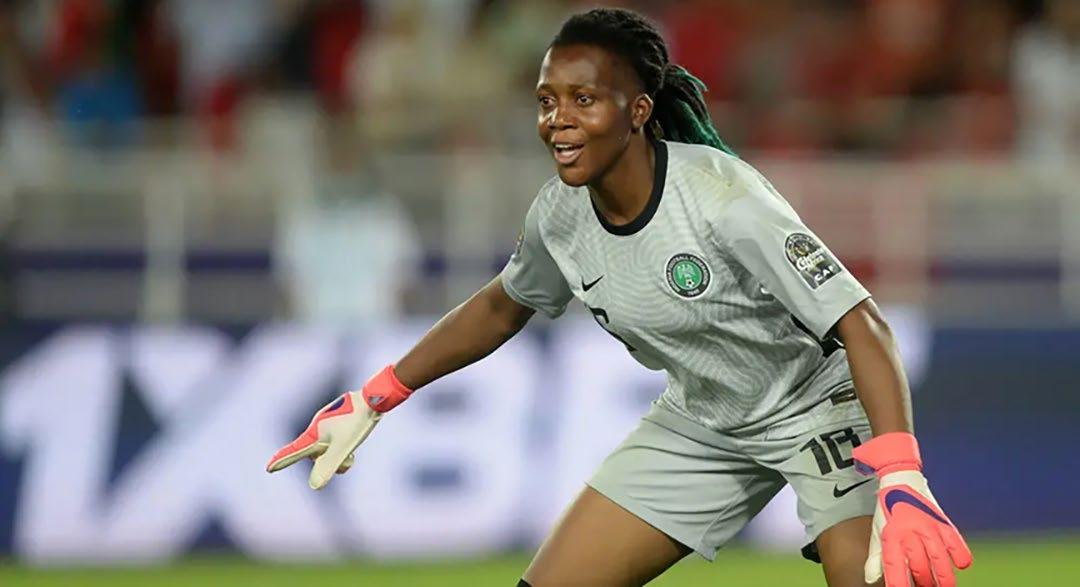
BY JUDE OBAFEMI
When Chiamaka Nnadozie picked her number 1 jersey at Brighton and Hove Albion on Friday, it marked more than just another squad number allocation. For the 24-year-old Nigerian goalkeeper, it was the culmination of a remarkable journey that has seen her evolve from a promising teenager in Port Harcourt to arguably Africa's finest shot-stopper and one of the most coveted goalkeepers in world football. Brighton's decision to hand Nnadozie the coveted number 1 shirt sends an unmistakable message about their ambitions for the upcoming Women's Super League campaign. The Seagulls have brought in one of European football's most consistent performers, a goalkeeper whose reflexes and composure have already been tested in the sport's most pressurised environments.
Born on December 8, 2000 in Orlu, Imo State, Nnadozie's
path to English football began in Nigeria's domestic league with Rivers Angels in 2016. Her performances between the posts were nothing short of extraordinary, helping the Port Harcourt-based side claim the Nigerian Women's Football League title in the 2019/2020 season alongside three Nigerian Women's Cup victories. Yet it was her international breakthrough that truly announced her arrival on the global stage.
International football has provided the stage for some of Nnadozie's most memorable moments

At just 19, Nnadozie found herself thrust into the spotlight at the 2019 FIFA Women's World Cup in France. Nigeria's encounter with South Korea would prove to be a defining moment, not just for the match outcome but for Nnadozie's burgeoning reputation. Her composed display between the posts earned a 2-0 victory for the Super Falcons whilst simultaneously etching her name into World Cup folklore as the youngest goalkeeper ever to record a clean sheet at the tournament. That breakthrough performance in France opened European doors that had previously seemed distant dreams. Paris FC recognised her potential, claiming her signature in January 2020 on an initial 18-month deal that would eventually extend her stay in French football for five transformative years.
Her tenure with Paris FC proved to be nothing short of spectacular. Across 97 league appearances and 16 European outings between 2022 and 2025, Nnadozie established herself as the division's premier goalkeeper. The 2023/2024 season brought particular recognition when she was crowned the league's outstanding goalkeeper, a distinction that reflected her consistent excellence throughout the campaign. Her trophy cabinet during this period expanded significantly. Paris FC's triumph in the French Cup bore Nnadozie's decisive fingerprints, whilst individual accolades continued to accumulate.
The significance of her achievements became even more pronounced when she became the first African player to claim both the National Union of Professional Footballers' best goalkeeper award and the French league's goalkeeper of the year honour.
International football has provided the stage for some of Nnadozie's most memorable moments. Her progression through Nigeria's youth ranks, beginning with the under-17 side in 2016, showed her development trajectory. The under-20 World Cup in 2018 offered another platform for her talents, where she featured in all four of Nigeria's matches and earned the player of the match award against Haiti. The 2023 World Cup in Australia and New Zealand perhaps best exemplified Nnadozie's mental fortitude under extreme pressure. Captaining Nigeria against Canada in their opening fixture, she produced a display of goalkeeping that will be remembered for years to come. Three crucial saves, including a penalty stop to deny Christine Sinclair, earned a valuable point for the Super Falcons whilst earning Nnadozie the player of the match accolade. Her heroics helped propel Nigeria into the knockout stages, demonstrating the impact a world-class goalkeeper can have on tournament football.
Such performances have earned her recognition beyond African football, with nominations for the prestigious Yashin Trophy at the Ballon d'Or awards underlining her global standing. The 2025 Women's Africa Cup of Nations provided the perfect prelude to her Brighton arrival. Nigeria's tournament victory was built upon Nnadozie's exceptional goalkeeping, performances that earned her the competition's best goalkeeper award. The Nigerian government's recognition of her achievements through the Officer of the Order of the Niger honour, alongside a $100,000 reward and a three-bedroom apartment in Abuja,
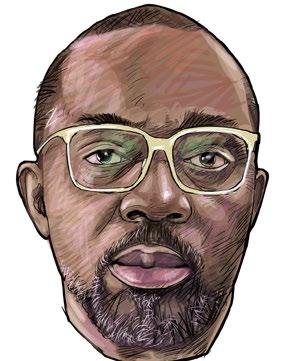

ogannah@thewillnews.com
Nigerians will confront a pivotal decision next year as the transformative tax legislation takes effect, introducing a 5 percent surcharge on refined fossil fuels alongside comprehensive personal income tax reforms. These measures form part of an ambitious package that authorities claim will boost revenue and modernise the fiscal system. Nigerians urgently need clarity on how these changes operate, who bears the additional burden and whether the government has concrete plans to shield the most vulnerable households from further economic hardship.
The fundamental legal transformation seeks to consolidate the numerous federal tax statutes into a unified Nigeria Tax Act. This legislation supersedes existing laws and establishes a framework that broadens the tax base, clarifies obligations regarding digital transactions and capital gains, and restructures income taxation. The Act introduces new collection and compliance procedures whilst expanding the revenue service's responsibilities. Crucially, it mandates a 5 percent levy on refined fossil fuel products at point of sale. While technically complex, these reforms will directly impact ordinary citizens through elevated energy costs, consequently driving up transportation expenses and prices for fuel-dependent goods and services.
The fuel surcharge applies to petrol and diesel sold domestically, whilst explicitly exempting cleaner alternatives, including domestic cooking gas and specific low-emission fuels. Implementation follows the timeline established in the reform bills, with government commentary suggesting the charge will simultaneously discourage fossil fuel consumption and generate development funds.
The immediate reality, however, points toward higher pump prices and increased financial pressure on public transport users and high-fuel occupations. Road traders and small businesses operating on razor-thin margins will experience these cost increases acutely and immediately. Personal income tax modifications aim to create a more progressive system, whilst significantly altering tax obligations across worker categories. The new structure exempts annual incomes up to N800,000 whilst imposing higher marginal rates on larger incomes, reaching 25 percent for top earners. The government emphasises that this threshold will benefit very low earners, yet analysts highlight Nigeria's narrow formal tax base and the reality that many households already endure multiple cost pressures beyond direct income taxation. Since salaries for

numerous public and private sector workers will not rise to offset these shocks, disposable income may decline once fuel levies and indirect price effects are factored in.
Nigeria has weathered numerous economic disruptions recently. The 2023 fuel subsidy elimination, substantial currency devaluation and persistent high inflation have inflated costs for transport, staple foods, and essential services. The International Monetary Fund (IMF) and other institutions observe that inadequate infrastructure and weak social safety nets leave many households exposed to additional price increases.
Against this backdrop, new petrol charges will reverberate beyond petrol stations into higher market and transport prices. Economists caution that fuel cost escalations can accelerate inflation and push more households into poverty unless accompanied by targeted relief or demonstrable service improvements benefiting lowincome families.
Civil society organisations, unions, and merchant groups have responded forcefully to the fuel surcharge and broader tax package elements. They demand the suspension of the 5 percent levy, contending that it will deteriorate living conditions for low-income earners, women, youth, farmers
and informal sector workers still recovering from previous subsidy removal.
Road transport unions and agricultural groups warn the charge will be transferred to commuters and consumers, with commentators cautioning that public trust will erode if revenue fails to produce tangible benefits. The volatile public response to earlier subsidy changes demonstrates how quickly sentiment can shift when costs rise without corresponding public service improvements.
Authorities advance several justifications for these reforms. They argue that Nigeria must expand its tax base to ensure budget sustainability without excessive borrowing. Additionally, pricing fossil fuel consumption supports policy objectives that redirect investment toward cleaner energy. Officials contend that modernised revenue collection and clearer regulations should enhance compliance and improve long-term tax system equity. The critical question remains whether revenue will fund projects directly improving citizens' daily lives: Roads, public transport, healthcare facilities and schools. Without explicit commitments to ring-fenced spending and independent oversight, citizens will likely receive official promises sceptically.
I think that practical measures can minimise harm from these new policies whilst building public confidence. The state should publish clear plans detailing exactly how fuel charge proceeds will be utilised, providing quarterly accounting and public audits. Authorities should prioritise rapid, visible transportation infrastructure repairs and expand affordable urban mass transit, investments that reduce both time and financial costs for millions of commuters. Subsidised fares on state funded mass transit, as well as public healthcare facilities and free primary and secondary education will be a good start off point.
These significant tax changes represent a fundamental shift in state revenue generation strategies. Whilst potentially justified on fiscal grounds, success depends entirely on whether reforms translate into improved services and reduced hardship for ordinary citizens. Should the state increase revenue whilst failing to repair infrastructure, healthcare systems and schools or neglecting direct assistance for those most negatively affected, public backlash will be severe and social costs enormous. This is why I canvass that only transparent, publicly verifiable spending plans combined with immediate relief for the poor can make these reforms politically sustainable and economically rational.
Should the state increase revenue whilst failing to repair infrastructure, healthcare systems and schools or neglecting direct assistance for those most negatively affected, public backlash will be severe and social costs enormous